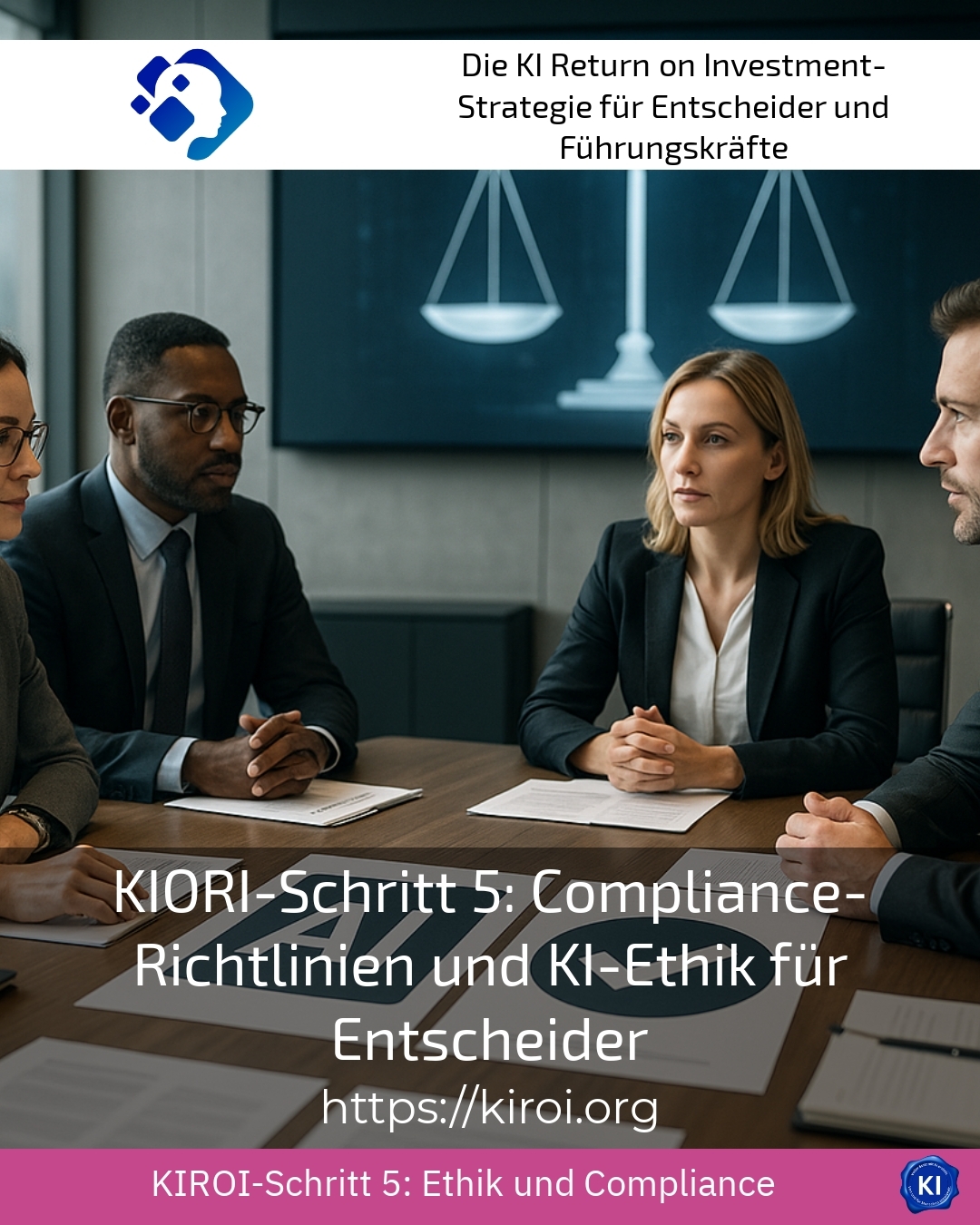Compliance guidelines are becoming increasingly important in companies, especially when dealing with complex technologies such as artificial intelligence. Decision-makers are faced with the challenge of understanding ethical and legal requirements in order to operate their AI systems responsibly and in compliance with regulations. Step 5 is a central pillar here, as clear compliance guidelines not only create security, but also provide impetus for the sustainable implementation of AI ethics in day-to-day business.
The relevance of compliance guidelines for decision-makers in the age of AI
Every company that uses AI systems must ensure that they not only function technically, but also fulfil legal and ethical requirements. Compliance guidelines help to systematise these obligations. In the financial sector, for example, where automated credit decisions are made, algorithms must be traceable and non-discriminatory in order to comply with regulatory requirements.
In healthcare, AI supports diagnoses and therapy suggestions, but without clear compliance guidelines, data protection violations or incorrect decisions could jeopardise patient well-being. Similarly, in the manufacturing industry, where AI-controlled robots are used, compliance guidelines minimise the risks of security breaches and liability issues.
In addition, compliance guidelines are a basis for implementing the increasing requirements of the EU AI Regulation in a legally compliant manner. This regulation governs the use of AI based on a risk-based approach and includes requirements on the transparency, fairness and security of AI systems.
Compliance guidelines as an ethical compass for AI projects
Compliance guidelines not only act as a legal shield, but also provide orientation for the integration of ethical principles in the company. Decision-makers should therefore take a close look at guidelines and best practices that focus on fairness, transparency and data protection.
For example, in the area of personnel management, where AI can help with the selection of candidates. Compliance guidelines ensure that the algorithms do not reproduce discriminatory patterns. In marketing, on the other hand, they help to use customer data responsibly by defining clear limits for data processing and storage.
Training employees and managers is also important. Only those who understand the compliance guidelines and apply them in practice can create trust in the company when dealing with AI. This is because clients often report that uncertainties regarding the use of AI arise due to a lack of or unclear compliance guidelines. Clear guidelines therefore effectively accompany important steps in project management and implementation.
BEST PRACTICE with one customer (name hidden due to NDA contract) The introduction of binding compliance guidelines helped the client to integrate AI into customer service. Employees were trained to handle sensitive data securely. This enabled the company to fulfil legal requirements and significantly increase customer satisfaction by processing enquiries faster and without errors.
Practical implementation of compliance guidelines in the organisational structure
It is important for decision-makers not to see compliance guidelines as a bureaucratic hurdle, but as an integral part of the corporate culture. This can create clear structures, for example by appointing AI ethics officers who act as internal experts on AI compliance issues.
In the automotive industry, for example, such officers take on the task of ensuring that AI systems in vehicles are not only technically flawless, but also comply with ethical standards, for example in the case of autonomous driving functions. In retail, they ensure clear rules for the use of recommendation engines that make customer-specific offers.
In addition, regular audits should be built in to continuously review and adjust adherence to compliance guidelines. This allows risks to be recognised and remedied at an early stage. In the energy sector, for example, such audits help to protect AI-controlled networks from cyberattacks while also fulfilling data security requirements.
BEST PRACTICE with one customer (name hidden due to NDA contract) Thanks to an established compliance monitoring process, an industrial company was able to continuously optimise its AI applications. The structured risk analysis and transparent documentation also created trust among business partners and supervisory authorities.
Compliance guidelines strengthen trust and ensure competitiveness
Compliance guidelines are essential for decision-makers in order to not only fulfil legal requirements, but also to assume ethical responsibility. This increases the acceptance of AI applications among customers, partners and employees. The insurance industry, for example, supports the traceability of insurance decisions through transparent AI models.
Binding compliance guidelines also increase the sustainability of AI projects in the area of research and development. Development teams are motivated to systematically consider aspects such as freedom from bias and data integrity when programming.
In the long term, the implementation of compliance guidelines makes a significant contribution to reducing liability risks and putting the business on a solid ethical footing. For SMEs in particular, clear guidelines provide practical orientation for integrating AI in a responsible and structured manner.
BEST PRACTICE with one customer (name hidden due to NDA contract) A medium-sized company used compliance guidelines specifically to make its AI-supported data analysis in product development more secure. This supported management in making informed decisions and at the same time conveyed a clear stance on ethical responsibility when handling customer data.
My analysis
Compliance guidelines are essential for decision-makers in the age of artificial intelligence. They provide both legal protection and ethical guidelines for dealing with complex technologies. With clear guidelines, risks can be minimised, liability issues clarified and acceptance created among all parties involved. Companies benefit in the long term because they can position themselves responsibly and utilise innovation potential in the long term. Step 5 shows how compliance guidelines can be integrated into the AI strategy as an indispensable component.
Further links from the text above:
AI compliance - definition and practice
Ethics guidelines in the EU and Germany for AI
AI compliance in companies - legal aspects
Implementation guide for the AI Regulation
For more information and if you have any questions, please contact Contact us or read more blog posts on the topic Artificial intelligence here.















